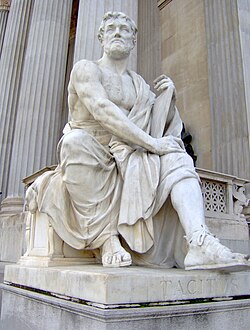Tacitus Quote
Related Quotes
About Tacitus
Publius Cornelius Tacitus, known simply as Tacitus ( TAS-it-əs, Latin: [ˈtakɪtʊs]; c. AD 56 – c. 120), was a Roman historian and politician. Tacitus is widely regarded as one of the greatest Roman historians by modern scholars.
Tacitus’ two major historical works, Annals (Latin: Annales) and the Histories (Latin: Historiae), originally formed a continuous narrative of the Roman Empire from the death of Augustus (14 AD) to the end of Domitian’s reign (96 AD). The surviving portions of the Annals focus on the reigns of Tiberius, Claudius, Nero, and those who reigned in the Year of the Four Emperors (69 AD).
Tacitus's other writings discuss oratory (in dialogue format, see Dialogus de oratoribus), Germania (in De origine et situ Germanorum), and the life of his father-in-law, Agricola (the general responsible for much of the Roman conquest of Britain), mainly focusing on his campaign in Britannia (De vita et moribus Iulii Agricolae). Tacitus's Histories offers insights into Roman attitudes towards Jews, descriptions of Jewish customs, and context for the First Jewish–Roman War. His Annals are of interest for providing an early account of the persecution of Christians and one of the earliest extra-Biblical references to the crucifixion of Jesus.
Tacitus’ two major historical works, Annals (Latin: Annales) and the Histories (Latin: Historiae), originally formed a continuous narrative of the Roman Empire from the death of Augustus (14 AD) to the end of Domitian’s reign (96 AD). The surviving portions of the Annals focus on the reigns of Tiberius, Claudius, Nero, and those who reigned in the Year of the Four Emperors (69 AD).
Tacitus's other writings discuss oratory (in dialogue format, see Dialogus de oratoribus), Germania (in De origine et situ Germanorum), and the life of his father-in-law, Agricola (the general responsible for much of the Roman conquest of Britain), mainly focusing on his campaign in Britannia (De vita et moribus Iulii Agricolae). Tacitus's Histories offers insights into Roman attitudes towards Jews, descriptions of Jewish customs, and context for the First Jewish–Roman War. His Annals are of interest for providing an early account of the persecution of Christians and one of the earliest extra-Biblical references to the crucifixion of Jesus.
